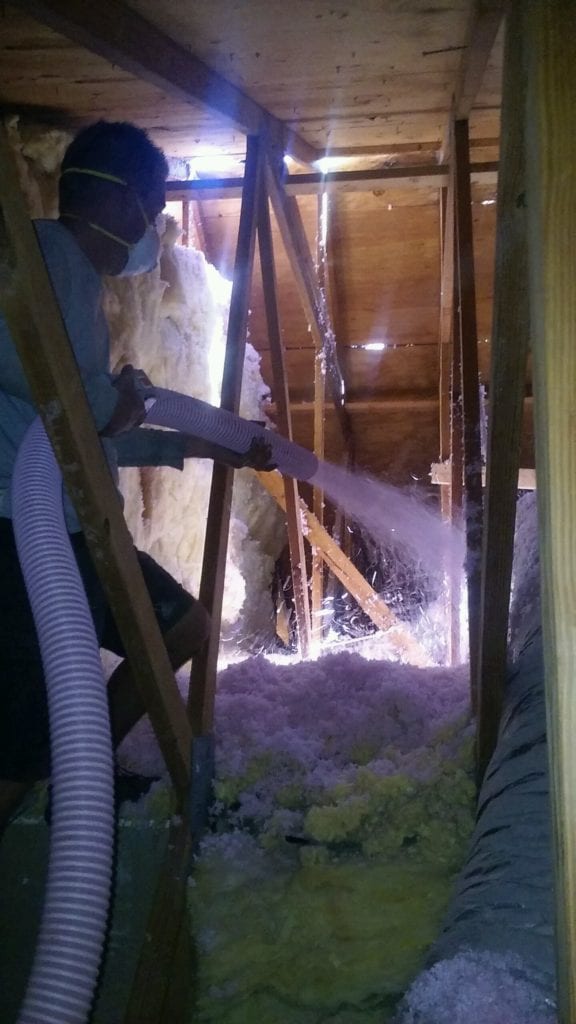 Done Rite Insulation is an established insulation contractor based offering its services to both commercial and domestic establishments in the Clearwater metropolitan area and the cities as well as counties surrounding Clearwater. Florida Energy extends spray foam, attic, and block wall insulation services that safeguards roofs, attics, walls, windows, floors, and doors from hurricanes, deluges, storms, and extremes of temperatures.
Done Rite Insulation is an established insulation contractor based offering its services to both commercial and domestic establishments in the Clearwater metropolitan area and the cities as well as counties surrounding Clearwater. Florida Energy extends spray foam, attic, and block wall insulation services that safeguards roofs, attics, walls, windows, floors, and doors from hurricanes, deluges, storms, and extremes of temperatures.
This insulation contractor based in Clearwater also recommends you to effectively insulate the walls, attics, and roofs of your homes or offices in order to bring down energy losses and save on energy/utility bills. Following are the top 6 frequently asked questions posed by those who’re looking forward to engaging the contractor for a house insulation project.
How much savings can I expect by insulating or renovating the insulation on the floors, ceilings, roof, and walls of my office or home?
As per one estimate of the US Department of Energy, an archetypal family in the US spends approximately $1,500 annually on account of energy usage. The statistics reeled out by the DOE clearly indicate that out of the total energy expense, costs of cooling and heating account for about 44%. You can save up to 50% on your energy expenses if you follow specific steps with regards to house insulation. Opting to step up the thermal insulation of your current office or home setup is one significant way of doing so.
What is the level or extent of insulation that my house should’ve?
By spending a modest amount for improving the insulation structure or setup of your home, you can look forward to saving a handsome amount on your month-to-month energy bills. In fact, you’ll be saving much more than you expend on insulating the home or office, and money saved is money earned. If your home was constructed or built prior to 1980, you might need to go in for enhancing the padding on the roof, attic joists, floors, and walls.
Differentiate between foam, fiberglass, slag wool and rock, and cellulose insulation?
Rigid boards or hard boards are foam insulated that are extensively used for sealing gaps or blocks in between the roof or attic trusses or beams. Paperboard reinforced with flame-retardant elements usually constitutes cellulose type of insulation. Fiberglass is fashioned out of recycled glass or molten sand in a controlled environment. Slag or rock wool is manufactured in a manner similar to fiberglass, only the raw materials are different-slag from blast furnace and natural rock. Aluminum foils are used for fabricating reflective materials that are buttressed with plastic films or polyethylene bubbles. The objective behind using any insulation material is to block or impede heat or cold transfer.
What to keep in mind before and after choosing an insulation contractor?
Before you can make a shortlist of 4-5 insulation contractors or firms, ensure that you crosscheck the shortlisted businesses against specific parameters. These among other things will include company background, number of years in service, positive feed backs from customers, and the specialized services they’re offering. After you zero in one contractor from your shortlist, make sure that the service provider has undertaken projects similar to the one that you’ve ordered. Also find out about the payment method, the types of insulation on offer, and the listed R-values of every insulation type.
Why rent an insulation contractor and not a general or home renovation contractor?
Professional contractors have the appropriate certifications for carrying out your insulation project with perfection that’ll enable to reduce energy consumption in your home and save on utility bills.
From where can I find out additional info regarding insulation?
You can gather detailed info regarding any kind of insulation project from US Department of Energy & Energy Star; North American Insulation Manufacturers’ Association, Cellulose Insulation Manufacturers’ Association, and Spray Polyurethane Foam Alliance.



